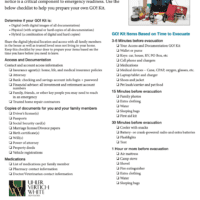Securing Your Legacy: The Importance of Estate Planning
After working diligently to amass your wealth and create a comfortable life for yourself and your loved ones, it’s easy to push off a crucial aspect of your financial strategy: estate planning. In honor of National Estate Planning Month, we delve into the signifi cance of estate planning, emphasizing the benefits it offers, from protecting your assets to ensuring a smooth transition of wealth to the next generation.
The Basics of Estate Planning
Estate planning is a comprehensive financial strategy that involves the organization and distribution of your assets upon your passing. It’s not just about writing a will; it encompasses various aspects, including:
Will. A will is a legal document outlining how your assets will be distributed aft er your death. It’s the cornerstone of estate planning, allowing you to specify
benefi ciaries and appoint guardians for minor children.
Trusts. Trusts are versatile tools that enable you to manage your assets during your lifetime and control their distribution after your passing. There are various types of trusts, each serving specific purposes, such as revocable living trusts, irrevocable trusts, and charitable trusts.
Power of Attorney. Th is document authorizes someone to make fi nancial decisions on your behalf if you become incapacitated.
Healthcare Proxy. A healthcare proxy designates a person to make medical decisions for you if you are unable to do so yourself.
Beneficiary Designations. Ensuring your benefi ciary designations on accounts like retirement plans and life insurance policies
are up to date is essential for a seamless transfer of assets.
Benefits of Estate Planning
Asset Protection. Estate planning can shield your wealth from potential creditors, lawsuits, and excessive taxation. Structuring your assets within trusts and utilizing various strategies can help safeguard your hard-earned wealth.
Minimizing Taxes. Wealthy individuals are oft en subject to estate taxes, which can significantly reduce the assets passed on to heirs. Proper estate planning can help minimize the impact of estate taxes through tools like the unified federal gift and estate tax exemption and gift ing strategies.
Preserving Family Harmony. Without a clear estate plan, disputes among heirs can lead to family rift s and legal battles. By establishing your wishes in writing, you reduce the likelihood of conflicts and provide a smooth transition for your loved ones.
Protecting Your Legacy. Estate planning allows you to protect the legacy you’ve built, ensuring that your assets are used for the intended purposes, whether it’s funding your children’s education, supporting charitable causes, or preserving family businesses.
Avoiding Probate. Probate is the legal process that validates a will and administers the distribution of assets. It can be time-consuming, expensive, and public. Estate planning strategies like trusts can help your assets bypass probate, ensuring a faster and more private distribution.
Caring for Your Dependents. If you have minor children or dependents with special needs, estate planning lets you establish guardianship and provide financially for their well-being in your absence.
Estate Planning Strategies to Consider
Lifetime Gifting. Consider gifting assets during your lifetime to reduce the size of your taxable estate. The annual gift tax exclusion allows you to gift a certain amount to each recipient tax-free.
Charitable Giving. Establishing charitable trusts or foundations can help you support causes close to your heart while providing tax benefits.
Family Limited Partnerships. This strategy allows you to transfer assets to family members while retaining control. It can be particularly useful for passing down family businesses.
Life Insurance. Life insurance can be a valuable tool for estate planning. It can provide liquidity to cover estate taxes and ensure your heirs receive their inheritance promptly.
Roth Conversions. Converting traditional retirement accounts to Roth IRAs can reduce the tax burden on your heirs by allowing them to inherit tax-free assets.
Asset Protection Trusts. These trusts can shield your assets from potential lawsuits and creditors while providing benefits to your heirs.
National Estate Planning Month serves as a reminder of the importance to secure your financial legacy. Wealthy Americans, in particular, should view estate planning as a fundamental component of their financial strategy. Don’t wait until it’s too late; consult with a qualified financial advisor and estate planning attorney to create a tailored plan that reflects your unique circumstances and family directives. Your legacy deserves nothing less than the best protection.
This material is being provided for information purposes only and is not a complete description, nor is it a recommendation. Raymond James is not affiliated with any of the external organizations mentioned. Certified Financial Planner Board of Standards, Inc. (CFP Board) owns the certification marks CFP®, CERTIFIED FINANCIAL PLANNERTM, and CFP® (with plaque design) in the United States, which it authorizes use of by individuals who successfully complete CFP Board’s initial and ongoing certification requirements.
Certified Financial Planner Board of Standards Inc. owns the certification marks CFP®, CERTIFIED FINANCIAL PLANNERTM, CFP® (with plaque design) and CFP® (with flame design) in the U.S., which it awards to individuals who successfully complete CFP Board’s initial and ongoing certifi cation requirements.
Every investor’s situation is unique and you should consider your investment goals, risk tolerance and time horizon before making any investment. Prior to
making an investment decision, please consult with your fi nancial advisor about your individual situation.
The foregoing information has been obtained from sources considered to be reliable, but we do not guarantee that it is accurate or complete, it is not a statement of all available data necessary for making an investment decision.







